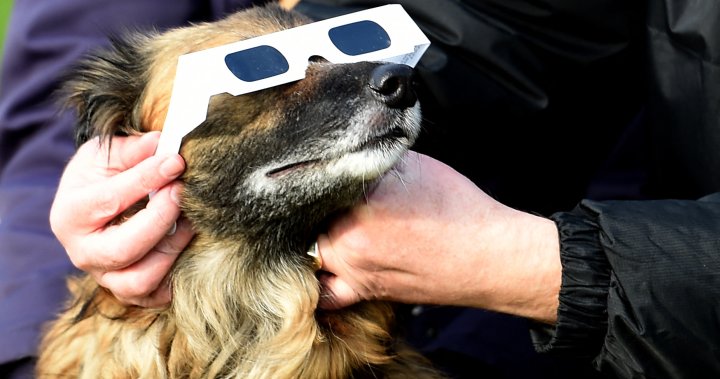Instructions:
Want to discuss? Please read our Commenting Policy first.
If you get Global News from Instagram or Facebook – that will be changing. Find out how you can still connect with us.
As Canadians eagerly anticipate the upcoming solar eclipse, the question on many minds is whether their beloved pets can partake in the celestial spectacle.
Some may worry about the potential harm to their pets’ eyes, while others may be curious about any behavioural changes their dogs or cats might exhibit during the eclipse’s total blackout.
“A lot of the excitement for people is going to be overwhelming for animals,” said Dr. Karen Ward, chief veterinary officer at the Toronto Humane Society. “So it can be really fun for people to be out with a whole bunch of other people celebrating this really incredible event together. But it doesn’t mean their dog wants to be part of it.“
On Monday, the solar eclipse’s path of totality will pass through parts of Ontario, Quebec, New Brunswick, Prince Edward Island, Nova Scotia, and Newfoundland and Labrador. Read more about where the eclipse path will take place and when.
The Toronto Humane Society sent out an advisory on Wednesday, cautioning pet owners about potential risks posed by the solar eclipse. While animals usually avoid direct sun-gazing, the organization emphasized concerns regarding the event’s accompanying large crowds and noise, which could unsettle pets.
While the event of an eclipse does not appear to pose any significant health risk for pets like dogs and cats, Ward said there are some issues to keep in mind.
During the eclipse, your dog or cat may exhibit changes in behaviour, such as acting nocturnal during total darkness or showing signs of increased anxiety, according to Ward.
She pointed to a 2020 study published in Animals, which observed zoo animals during a solar eclipse. The study found that during the 2017 eclipse in the United States, around 75 per cent of the observed species exhibited a behavioural response, with a majority of the animals engaging in their evening or nighttime behaviours. For example, gorillas started getting ready for bed, giraffes displayed increased anxiety and Galapagos tortoises began mating.
Ward believes some of this behaviour, such as getting ready for bed, may also be seen in pets.
She added that because pets tend to pick up on their owners’ energy, any excitement or nervousness may also influence how they feel.
“The biggest recommendation is just to keep them inside,” she stressed. “We’re encouraging folks to go out with their human family and friends to experience and enjoy the eclipse, but just to leave their pets at home. It can be a little confusing to them when there’s that change in light.”
And when your pet is inside the home, she recommends keeping them comfortable with their favourite bedding or giving them treats.
People must wear protective eyeglasses for the eclipse to safeguard against the intense brightness of the sun’s rays, which can cause serious eye damage if viewed directly.
However, Ward said pets instinctively avoid looking at the sun, making it unnecessary to purchase or make them wear protective eyewear.
“They are not going to look up unless they’re encouraged to look up — and we are strongly asking people not to do that,” Ward said. “So they have a fair bit of common sense… it’s not normal behaviour for our pets to stare at the sun.”
The solar eclipse is anticipated to attract massive crowds, with people from all over converging on prime viewing locations.
For example, one of the prime locations for viewing the eclipse is in the Niagara Region with thousands of people expected to flock to the area on Monday. In response to the anticipated influx, local authorities declared a state of emergency in the Niagara Region.
Dr. Rebecca Greenstein, a veterinarian medical advisor for Rover, said a lot of people may be tempted to bring their pets with them to an eclipse viewing party, but she advised leaving them at home if possible.
“For most pets, they really thrive in familiar environments with the familiar sounds, familiar, smells. And they really don’t appreciate being brought along as a plus one. It’s probably safest for them to be staying at home or with a trusted pet site,” she said.
She mentioned that some more social dogs might fare better in large crowds, while animals prone to anxiety may need extra care. For anxiety-prone pets, Greenstein recommends sticking to their routine and providing added reassurance and distraction.
If you decide to bring your pet along, she advises ensuring you have food and water for them and keeping your dog on a leash. This is important as the extra excitement, or the total eclipse, may spook your pet.
— With files from Global News’ Saba Aziz
The latest health and medical news emailed to you every Sunday.
The latest health and medical news emailed to you every Sunday.

